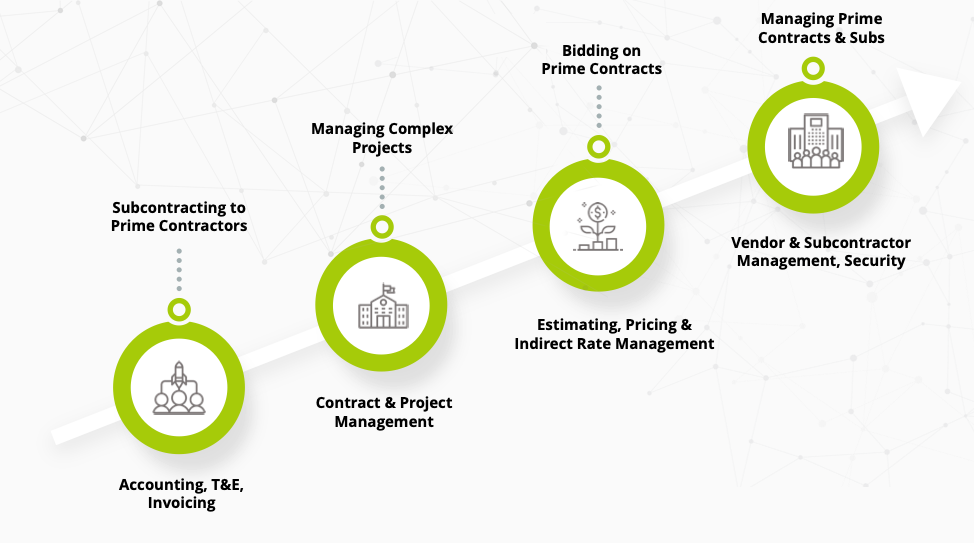- Solutions
- Partners
- Resources
- Blog
- GovCon Source
- GovCon Source Home
- Lean & Agile in the Age of DOGE
- Service Contract Act (SCA)
- DCAA Compliant Accounting
- GovCon Outsourcing & Managed Services
- Government ERP Systems
- Veteran-Owned Small Businesses
- GovCon CyberSecurity
- Graduating 8(a) Program
- SBIRs & Grants
- GovCon Growth Strategies
- GovCon Compliance Audits
- Webinars
- DCAA Compliance
- GovCon Accounting
- Graduating 8(a) Program
- Service Contract Act (SCA)
- GovCon Managed Services
- Government ERP Systems
- GovCon Reviews & Audits
- Cybersecurity Compliance
- Government Grants & Contracts
- Company

DCAA Compliance and GovCon Accounting
Understand the basics of DCAA Compliance and how proper accounting practices can prepare your Government Contracting business for DCAA audit.
Self-Assessment Checklist
Answer a few questions to see if you are correctly and efficiently handling your Cost Contracts.

DCAA Approved Accounting System Overview
 Federal contractors need to implement a range of processes and systems as they grow from a start-up to a prime contractor. Your accounting system is the cornerstone for building required capabilities. It must help you comply with government regulations you’ll need to follow when managing grants and contracts. The accounting system must also help you eliminate adverse audit findings from DCAA-conducted audits. You are probably asking why not just buy a DCAA-approved accounting system. The fact of the matter is, there is no such thing as a DCAA-approved government accounting system. A compliant accounting system is more than just a software package. It includes accounting methods, policies procedures, and controls. Many accounting software applications can be part of an acceptable accounting system or set up in a manner that fails to meet the requirements of an acceptable system.
Federal contractors need to implement a range of processes and systems as they grow from a start-up to a prime contractor. Your accounting system is the cornerstone for building required capabilities. It must help you comply with government regulations you’ll need to follow when managing grants and contracts. The accounting system must also help you eliminate adverse audit findings from DCAA-conducted audits. You are probably asking why not just buy a DCAA-approved accounting system. The fact of the matter is, there is no such thing as a DCAA-approved government accounting system. A compliant accounting system is more than just a software package. It includes accounting methods, policies procedures, and controls. Many accounting software applications can be part of an acceptable accounting system or set up in a manner that fails to meet the requirements of an acceptable system.
OneLynk: DCAA Compliant ERP Platform from AtWork
OneLynk provides an integrated suite of contract and project lifecycle management tools to support
every task required to successfully manage government contracts and deliver projects.
every task required to successfully manage government contracts and deliver projects.
Growing Your GovCon Capabilities

To have a DCAA compliant accounting system, it must help you comply with a range of government regulations, including:
- FAR and CAS,
- SF 1408 Pre-Award Survey,
- Incurred Cost Submission.
Many government contractors start with QuickBooks. However, as they take on more complex contracts, or become a prime contractor that requires more comprehensive financial management they’ll need a DCAA-compliant system.
We have compiled a list of frequently asked questions associated to government regulations that will be invaluable in guiding your selection and implementation of a DCAA compliant accounting system.
What Is FAR and CAS, FAR Part 31 - What Do I Need to Know?
![]() View: What Is FAR and CAS - FAR Part 31 - What Do I Need to Know
View: What Is FAR and CAS - FAR Part 31 - What Do I Need to Know
If you're a federal contractor, at some point you will be faced with understanding and complying with federal regulations regarding acquisitions and accounting. These regulations are described in a series of publications called the FAR and CAS.
What is the Federal Acquisition Regulation (FAR)? The FAR is the primary regulation used by all Federal Executive agencies in their acquisition of supplies and services with appropriated funds. The purpose of the FAR is to provide a set of consistent, uniform policies, guidelines, and procedures governing the federal acquisition process.
FAR is all about allowability. It says what you can charge to the government when providing supplies or service for a contract and what you cannot. It defines when and to what extent, cost can be recovered under a government contract.
What is the Federal Cost Accounting Standard (CAS)? CAS is a set of standards and rules established by the federal government to help achieve uniformity and consistency in the cost accounting principles within federal contracting. CAS also sets forth regulations that require contractors to disclose their cost accounting practices, to follow the disclosed practices consistently, and to comply with specified standards.CAS is all about allocability. It says how you charge to contracts, what gets charged to which contracts, describes how you must maintain your accounting systems, and tells you how the costs must flow from incursion to final cost objectives. It also instructs contractors on how to account for certain types of costs.
What Are the Accounting Requirements for a DCAA Approved Accounting System?
![]() View: Understanding Accounting Requirements for Managing Government Grants and Contracts
View: Understanding Accounting Requirements for Managing Government Grants and Contracts
You've worked hard to position your firm to win its first government contract. Now comes the tricky part ... managing the funds you receive properly. The federal government purchases supplies and services from firms like yours using many different contract arrangements. To stay out of trouble and position your firm for additional contract awards you'll need to understand the accounting requirements for managing the funds properly. Ideally, you want to put the accounting system in place before the award is made. You need a DCAA bookkeeping system that tracks all the organization's cost and allows you to separate your cost by what is allowable (direct and indirect), and what is unallowable. Your accounting system must help you demonstrate that your indirect cost allocation methodology is fair and equitable and can withstand the scrutiny of a government audit.
What Is the SF 1408 and Pre-Award Survey - What Do I Need to Know?
Just in case you are completely new to Government Contracting, let's quickly level set on the mission of the Defense Contract Audit Agency (DCAA). Their primary function is to perform contract and financial audits for agencies that are responsible for acquisition and contract administration for the US Government. DCAA audits ONLY government contractors like you. They conduct these audits in accordance with the Generally Accepted Government Auditing Standards (GAGAS). The principles that GAGAS embodies are unbiased audit conclusions based on facts. The DCAA website dcaa.mil is an excellent resource for those that are new to government contracting or those that have been at it for quite some time. We recommend a visit to the web site and most specifically the customers tab and select check lists and tools https://www.dcaa.mil/ChecklistsAndTools/ then select Pre-award Accounting System Adequacy Checklist to help you more thoroughly prepare for impending audits. If the checklist appears daunting don't worry, we have industry experts available to assist you.
Learn More: Pre-Award Accounting System Survey (SF1408) - What You Need to Know
What Are DCAA Compliant Indirect Rates - How to Calculate Them?
Government contractors (GovCons) need competitive indirect rates to win new contracts. So, understanding how to calculate indirect rates must become a fact of life for firms having or seeking government funding. Financial success in this environment depends on avoiding regulatory and administrative traps along with optimizing your competitive position.
Winning and managing cost-type contracts requires you to disclose to the government how your indirect rates were calculated. This requires setting up a DCAA compliant accounting system that can be used to support forward pricing, provisional billing, and final rates for contract closeout.
If you're just entering the government contracting market and have received your first contract or grant you may find the distinction between direct costs and indirect costs frivolous, since all costs are supporting a single contract or grant. That is a correct observation until you receive another award or land a non-governmental source of revenue. Firms having a single government award are an exception and it's a poor excuse to ignore the concept of indirect rates.
Learn More: Understanding the Basics of Indirect Rates - How to Calculate Them
What Are DCAA Compliant Indirect Rates - Why You Need Bid, Target, Actual and Forecast Rates?
 Competitive indirect rates are key factors to winning government grants and contracts. Your company's indirect rates provide crucial insight into how well your company manages its costs - a very important detail when you're doing business with the government. Competitive indirect rates tell the government that your company has a low financial performance risk. Well-run government contractors prepare an annual operating budget and use it to develop target indirect rates. Establishing target rates provide a way to monitor your organization's actual financial performance against what was planned. If you have a cost-type grant or contract you will be required to prepare and submit a forward pricing proposal to the government which includes your annual budget as well as justification for your billing rates. This information will be used to create provisional rates that will be used when generating project job cost reports and customer invoices. The government will use this data to monitor your performance on any cost contract.
Competitive indirect rates are key factors to winning government grants and contracts. Your company's indirect rates provide crucial insight into how well your company manages its costs - a very important detail when you're doing business with the government. Competitive indirect rates tell the government that your company has a low financial performance risk. Well-run government contractors prepare an annual operating budget and use it to develop target indirect rates. Establishing target rates provide a way to monitor your organization's actual financial performance against what was planned. If you have a cost-type grant or contract you will be required to prepare and submit a forward pricing proposal to the government which includes your annual budget as well as justification for your billing rates. This information will be used to create provisional rates that will be used when generating project job cost reports and customer invoices. The government will use this data to monitor your performance on any cost contract.
Learn More: Understanding the Basic of Indirect Rates - Managing Projects using Bid, Target, Actual and Forecast Rates
What is the Incurred Cost Submission (ICS) - What Do I Need to Know?
The incurred cost submission (ICS) is required for all federal contractors holding cost-reimbursable or time and materials (T&M) contracts and is a universal requirement regardless of the customer's agency. Under cost-reimbursable and T&M contracts when you bill costs incurred, you are using provisional or estimated indirect rates, the ICS allows you to "true-up" the bills using the actual rates. All contracts requiring the incurred cost submission will include the Federal Acquisition Regulations "Allowable Cost & Payment Clause" (FAR 52.216-7) and/or the "T&M Payment Clause" (FAR 52.232-7). Be ready for an ICS audit by understanding these concepts.
Learn More: What is the Incurred Cost Submission (ICS) - What You Need to Know
Is Quickbooks DCAA Compliant - Questions to Ask
As a government contractor, you'll have many growing pains! If you've been fortunate enough to win government grants or contracts ... it's time to put in place a DCAA-compliant project accounting system that will streamline operations while also improving compliance. Managing government grants, contracts and projects requires a robust set of processes and systems, including project management and accounting tools to handle the funding correctly while complying with government reporting requirements. Your accounting system must track all the organization's costs and allow the cost to be separated by what is allowable (direct and indirect), and what is unallowable. Each grant or contract must be allocated a portion of the indirect costs. The accounting system must help you demonstrate that your indirect cost allocation methodology is fair and equitable and can withstand the scrutiny of a government audit. Your project management system must provide detailed job cost reports while supporting the entire project lifecycle including estimating, planning, executing (operating), and reporting. Supporting all these functions requires putting in place project cost accounting software.
If your organization is like many small businesses, you've implemented standalone tools for accounting and project management. Standalone accounting software, such as QuickBooks, allow accountants to record and track project direct cost but can't provide the project team with timely job cost reports containing the allocated indirect cost, forcing you implement "bolt-on" solutions or putting in place manual processes supported by spreadsheets. These spreadsheets may track important project information such as labor, expenses, and material charges but they don't provide the complete view because they don't show the fully burdened cost, they introduce the possibility for errors, and they also introduce costly and inefficient manual processes.
Accurate and timely job cost reports are essential to understanding the total cost of a grant or contract and for making decisions and reporting. The problem with standalone PM tools such as Microsoft Project is they were designed for project planning, so they lack the project cost accounting features required to support the entire lifecycle. They don't support the ability to view project cost data in real-time which includes allocated indirect costs.
If your organization is using QuickBooks, you may be working harder than you need to.
Learn More: Switching from QuickBooks to a DCAA Compliant Accounting System - Ten Questions You'll Need to Ask
What Are the DCAA Compliance Benefits of Automating the Accounting Close Process?
![]() View: Automating the Accounting Close - How to Improve Your Monthly and Yearly Close
View: Automating the Accounting Close - How to Improve Your Monthly and Yearly Close
Are You Ready for a DCAA Accounting System Audit?
Every government contractor prefers to be in the low-risk pool for being audited-but contractors who have been awarded a cost-reimbursable contract have a 100% chance of being audited by the Defense Contract Audit Agency (DCAA). Company size and its determination of adequacy along with risk also play a big factor: large government contractors that exceed $250 million in auditable dollar volume (ADV) will be audited without question, whereas contractors below that threshold may not be. In either case, the Government reviews the completeness and accuracy of your Incurred Cost Submission when determining if your firm should be audited. Therefore, Government contractors should know what guidance the DCAA is following regarding selecting incurred cost submission (ICS) for audit to best prepare their incurred costs and decrease their risk.
To begin their review, the DCAA uses an adequacy checklist and performs a risk assessment. The DCAA accounting system audit checklist of final direct and indirect incurred costs ensures compliance with the contractual agreements under Federal Acquisition Regulation (FAR). It includes approximately 50 questions, covering general and administrative expenses, overhead expenses-and more-to ensure contractors are readily prepared for an audit.
The DCAA also considers the operating history of the company. For example, have there been past incidents within the company that would raise a red flag? Are there any risks related to the company's operations and internal controls? What were the results of previous audits? The DCAA considers each of these questions and others before making their final determination.
Learn More: Are You Ready for a DCAA Accounting System Audit?
Learn More About AtWork Systems
AtWork Systems is an Arlington, Virginia based software development company. Its principals have decades of experience doing business with and working for federal, state, and local government. They developed OneLynk as a configurable and scalable business operating platform that digitizes and optimizes processes while providing just in time business intelligence for decision making. OneLynk contains a suite of easily configurable web applications for automating and monitoring business transactions, including: human capital management, finance, timekeeping and expense management, procurement, contracts and project management, payroll services and more. Check it out at www.AtWorkSys.com and see for yourself!
Ready for the Next Step?
Find out if AtWork’s integrated software suite and helpful team of GovCon experts can assist you. With more than a century of combined experience in government contracting, our team wants to hear from you.
